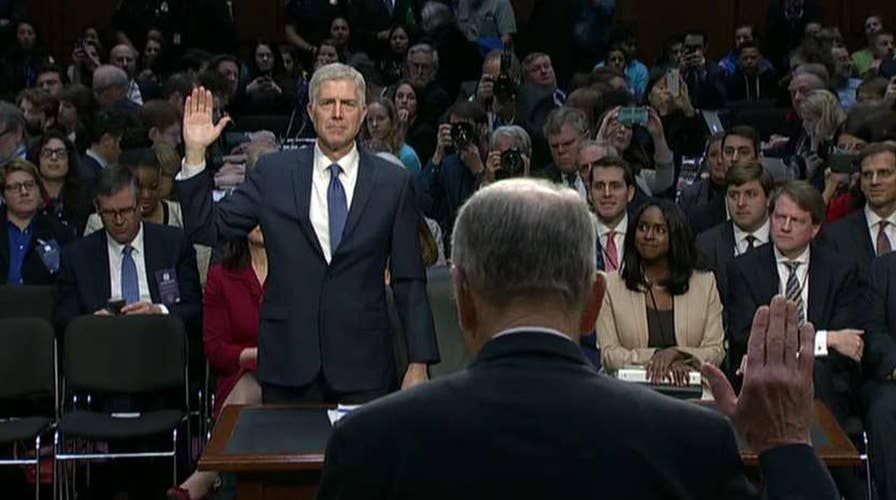Two Democratic senators now support Gorsuch
Democrats are still threatening to filibuster over the Supreme Court nominee
It was just a year ago when we first began hearing chants of “we need nine,” from former President Obama and Vice President Biden, Senate Democrats and their special interest groups.
To many of us, it appeared to be a simple case of amnesia. They obviously had simply forgotten that both Senator Reid and Senator Schumer had declared that George W. Bush would get no Supreme Court nominees through the Democratic Senate more than 18 months before the end of his term.
Or, even in 1992 when then-Senator Biden made clear his intentions in a long, detailed speech on the Senate floor outlining the reasons why the Senate wouldn’t consider a Supreme Court nominee of George H.W. Bush in his final year.
Despite this precedent, Senate Democrats and their special interest groups continued to demand—even after the election—that “we need nine.”
It’s become abundantly clear that if the Democrats are willing to filibuster somebody with the credentials, judicial temperament and independence of Judge Gorsuch, it’s obvious they would filibuster anybody.
Over the course of the past year I said that if I remained chairman of the Judiciary Committee in 2017, we’d move forward with a hearing for the Supreme Court nominee regardless of who was elected president.
To the surprise of many Senate Democrats, in November the American people elected Donald Trump. Suddenly we need nine became a hypocritical eight is enough, just like it was in 1992 and 2007.
Now, nearly nine months after candidate Trump publicly released the first of two lists of very capable possible Supreme Court nominees, the full Senate begins consideration of Judge Neil M. Gorsuch to be the 113th justice of the United States Supreme Court, starting with Monday’s vote in the Judiciary Committee which I chair.
Anybody watching the nomination hearing for Judge Gorsuch before the Senate Judiciary Committee witnessed a brilliant presentation showcasing his command of the law, his record of independence, his strong sense of humility, and his focus on following the Constitution instead of prejudging cases or promising results.
From beginning to end, partisans and non-partisans alike sang his praises. It started the first day of the hearing when President Obama’s former Solicitor General introduced Judge Gorsuch. For anybody questioning this nominee’s credentials, Democrat or Republican, I’d invite them to read General Neal Katyal’s introduction. It showed genuine appreciation for Judge Gorsuch himself and his approach to the law.
Judge Gorsuch’s testimony, and the testimony of witnesses who actually know him, creates a dilemma for anybody desperately searching for a reason to vote oppose his nomination. Because if you’re voting on qualifications and not politics, it’s an easy yes.
Despite the “we need nine” mantra from last year, we’ve already heard that Senator Schumer will lead a Democratic filibuster apparently based on hollow reasons that Judge Gorsuch has already answered. He’s not mainstream. He’s not independent. He’s not telling us how he’ll vote. And, now, because none of those accusations will stick, the Democrats have resorted to attacking his supporters. These same senators don’t like talking about the groups on the left who are attacking the nominee, misrepresenting his record and threatening to primary any Democrat who makes an independent decision.
It’s become abundantly clear that if the Democrats are willing to filibuster somebody with the credentials, judicial temperament and independence of Judge Gorsuch, it’s obvious they would filibuster anybody.
If we’re ever going to get past the well Senator Schumer poisoned when he led the Democrats to “change the ground rules” in 2001 and systematically filibuster circuit court nominees for the first time in our nation’s history, we’re going to need to dig a new well. With or without Senate Democrats.
Republican Chuck Grassley represents Iowa in the United States Senate where he serves as chairman of the Judiciary Committee.

